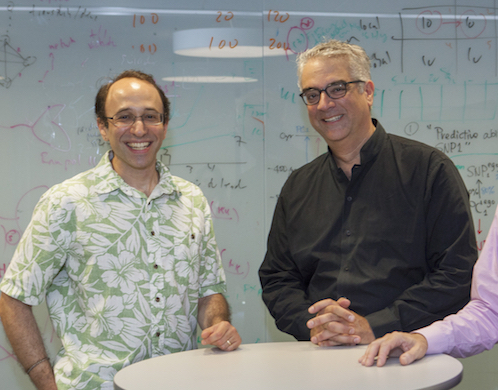Christakis and Spielman made Sterling Professors
Christakis and Spielman made Sterling Professors
The Sterling Professorship is the highest honor bestowed on Yale faculty, upon approval by the Yale Board of Trustees. Two of the four Sterling Professors announced this month, Daniel A. Spielman and Nicholas A. Christakis co-direct the interdisciplinary Yale Institute for Network Science.
Daniel A. Spielman, newly named as Sterling Professor of Computer Science, focuses his research on the design and analysis of algorithms, network science, machine learning, digital communications, and scientific computing.
Nicholas A. Christakis, a sociologist and physician who conducts research in the areas of network science, biosocial science, and public health, was named as Sterling Professor of Social and Natural Science.
Daniel A. Spielman
Spielman’s work helped revolutionize the field of error-correcting codes, which allow communication devices to transmit information even if part of it is corrupted. That work has made communication faster and more reliable and has been used for broadcasting high-definition television. In 2013, he and two collaborators solved the Kadison-Singer conjecture, a problem that had gone unsolved by mathematicians for more than 50 years. Its solution, scientists believe, could have significant implications for the field of statistics.A 1992 summa cum laude graduate of Yale, where he earned exceptional distinction in computer science and received the Beckwith Prize in mathematics, Spielman received his Ph.D. at the Massachusetts Institute of Technology. He served as an assistant and associate professor of applied mathematics at MIT before joining the Yale faculty in 2006 as professor of applied mathematics and computer science. Prior to his new appointment, he served as the Henry Ford II Professor of Computer Science.
Spielman has been recognized with numerous awards and honors for his scholarly contributions. In 2013, he received a MacArthur Fellowship, popularly known as the “genius” grant, from the John D. and Catherine T. MacArthur Foundation. He was awarded the 2010 Rolf Nevanlinna Prize from the International Mathematical Union, the 2009 Fulkerson Prize, and, on two occasions, the Gödel Prize for outstanding papers in the area of theoretical computer science. He is a member of the National Academy of Sciences.
Nicholas A. Christakis
Dr. Nicholas A. Christakis has been named as Sterling Professor of Social and Natural Science at Yale. He is a sociologist and physician who conducts research in the areas of network science, biosocial science, and public health.
The Sterling Professorship is the highest honor bestowed on Yale faculty, upon approval by the Yale Board of Trustees.
“I am deeply honored by this recognition,” Christakis said, “which reflects Yale’s substantial commitment to inter-disciplinary science and also the vibrant contributions of the many students and scholars on my research team. I am eager to make myself useful to Yale’s mission.”
Christakis directs the Human Nature Lab and is co-director of the Yale Institute for Network Science, which explores fundamental properties of social, biological, engineering, and computational networks, and invents approaches to intervene in them for the better.
Christakis’ research program includes large-scale randomized trials to improve maternal and child health in developing countries (such as Honduras and India), as well as basic science experiments exploring human social interactions, social genomics, the microbiome, and artificial intelligence.
A graduate of Yale College in 1984, Christakis received his M.D. from Harvard Medical School, his M.P.H. from the Harvard School of Public Health, and his Ph.D. from the University of Pennsylvania. At Yale, Christakis has appointments in the Departments of Sociology, Medicine, Ecology and Evolutionary Biology, Biomedical Engineering, and Statistics and Data Science, as well as at the School of Management. Before joining the Yale faculty in 2013, Christakis served as professor at Harvard University for 12 years. Prior to that, he was on the faculty at the University of Chicago, where he was also a clinical director of a hospice program delivering end-of-life care to underserved populations.
Christakis is the author of several books, including “Death Foretold: Prophecy and Prognosis in Medical Care” and “Connected: The Surprising Power of Our Social Networks and How They Shape Our Lives,” which has been translated into 20 languages. His new book, “Blueprint: The Evolutionary Origins of a Good Society,” will appear in early 2019. He has also written more than 180 peer-reviewed articles in professional journals.
Christakis was elected to the Institute of Medicine of the National Academy of Sciences in 2006; the American Association for the Advancement of Science in 2010; and the American Academy of Arts and Sciences in 2017. In 2009, he was named by Time magazine to its annual list of the 100 most influential people in the world.


